
Key Thought for this session:
“Without a compass, the journey is futile.”
Now, on to the second principle.
Absolute truth does not contradict itself. It does not meet one need at the expense of another. This is somewhat an expanded version of principle one we just discussed. This is an important test of absolute truth. When an action meets one or a few needs but harms other needs, then the action is not right. Relative truth takes a limited view of outcomes of an action. Absolute truth recognizes and takes into account the big picture; all potential outcomes. Absolute truth puts all forms of life into harmony. That’s a pretty profound realization, so let me say that again:
Absolute truth puts all forms of life into harmony.
We can easily focus on a narrow or limited need, like pleasure. But if you seek to satisfy pleasure, you can risk other needs like freedom or belonging.
I was talking with a student recently who got himself into trouble because he had over-used his ADHD drugs. His medicine successfully addressed the challenge he was having concentrating on his course work. But after a while, he found his health and his emotional stability degrading because he had become physically addicted to his drugs. So although this medicine solved one problem he had, it created several others.
Can something really align with truth when it solves one practical problem, but harms many other areas of life?
Anytime you act to meet a single need, then you must shine light into or expose how your action may harm yourself and others along the way. Satisfying a self-serving need may feel right, but is not truth. Here is an interesting question for you to ponder. Is this type of solution, then, an idol? Is it really just a counterfeit for truth?
For example, some people think that the truth about religion is that religion should produce “good people”. If Muslims, Jews, and Christians all believe God alone is worthy to be worshiped, then why are so many people in these religions devoted to power, hatred, judgmentalism, pleasure, comfort, safety, performance, etc.? Have they made their religion self-serving? The core flaw of a self-serving nature is that some things that really appeal to us also end up harming us in other ways or even harming others in the community.